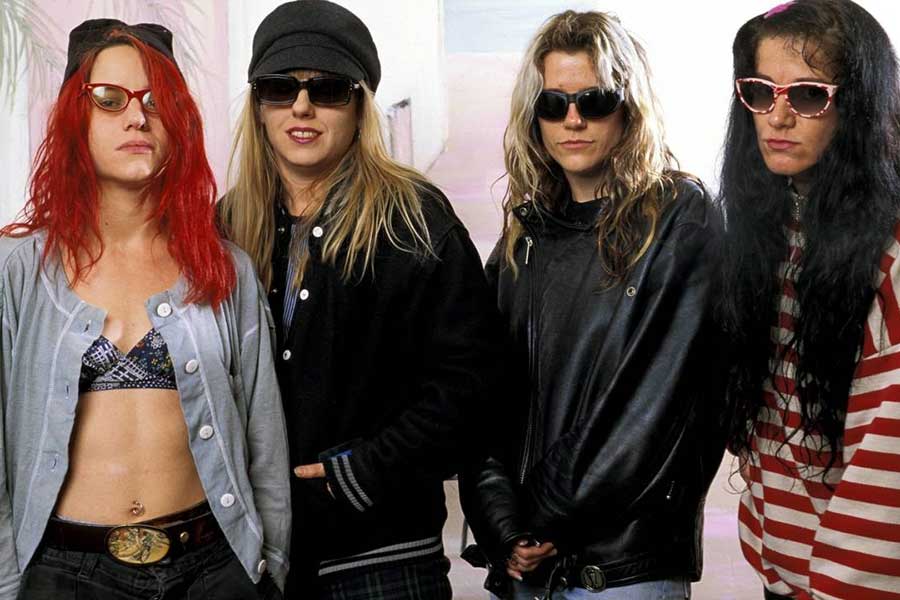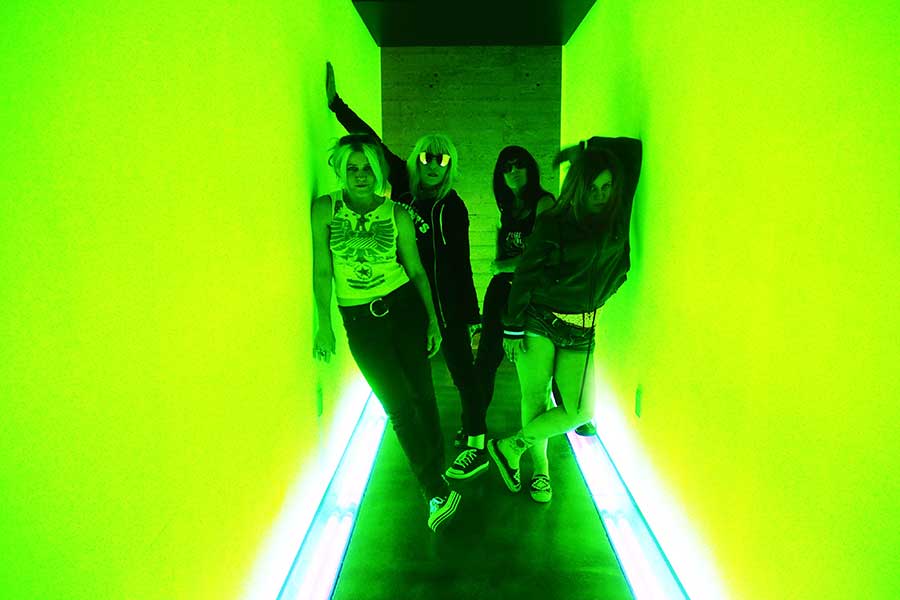
Grunge/punk pioneers L7 are back in action this spring with two new scorching singles and a short U.S. tour that will hit Philadelphia at The Trocadero on April 13.
Formed in 1985 by singer and guitarist Donita Sparks and guitarist Suzi Gardner, L7 were at the forefront of the alternative rock and grunge movements of the late 1980s and early ’90s sharing stages and drawing attention to activist causes such as Rock for Choice, along with the likes of Smashing Pumpkins, The Breeders and Nirvana. The band soldiered on through the 1990s before going on hiatus in 2001.
L7 reunited in 2015 and have been performing internationally. Apart from Sparks and Gardner, the group also features Jennifer Finch on bass and Dee Plakas on drums. Last fall, L7 released a crowd-funded documentary film about the band called “L7: Pretend We’re Dead.” The film is currently available on streaming services YouTube, Hulu and Google Play as well as on DVD and Blu-ray.
These days, like the early days, L7 is doing things on their own terms. They crowd-funded their documentary, their two latest singles (“Dispatch from Mar-a-Lago” and “I Came Back to Bitch”) and their upcoming tour.
Spark said the DIY nature of their work allows the band to do what they want, when they want.
“It’s not so much about creative control, because we’ve always had that,” she said. “For lack of having a label, we don’t want to wait for somebody to approach us. For now, we’re just putting out singles when we want to, and just going for it.”
The management of all aspects of the band is more than a full-time job, said Sparks.
“The last few years, the band has been front and center in our lives because it’s such a DIY operation. There is stuff to do constantly. I work every day on the band with business shit. It’s a constant between social media and all the stuff you have to do. I’m very much enjoying this cycle, though.”
In putting together the documentary, Sparks said she gained a certain level of clarity about the band’s history.
“For me, personally, I was completely wrong about any flaws I saw in my bandmates back in the day,” she said. “It’s weird how you can be wrong about shit. As an older person looking at our younger selves, I was very impressed with us, being that we’re not metal virtuosos. We’re punk rockers and yet we pulled up a really good hard-rock band. I still think so, to this day.”
In telling the band’s story, the documentary gives viewers a window into the time where the rules of rock music were rapidly evolving.
“We kicked off a lot of women in grunge and women in music in the 1990s,” Sparks said of L7’s impact on rock culture. “We crossed over into the metal scene. We crossed over into the arts scene. We crossed over into the fashion scene. We got our feet wet in a lot of different ponds, so to speak, which is very unique. Usually when we play metal festivals these days, we’re the only female band on the festival. I think that is cool, for us. I think the grunge era’s greatest legacy was how many women were in bands and doing their own thing. What I hear from young people is that they look at that as a golden era of women in rock.”
L7 has always had a visible and vocal gay and lesbian following throughout their career, Sparks said.
“We always had a huge dyke contingent. We had a huge gay contingent. The gays got our humor a lot, maybe more so than the hard-rock people. A lot of the dyke gals were smitten with us. That was always cool and they were always pretty ferocious as audience members. So we always strongly identified [with gay and lesbian audiences].”
Besides grunge and punk, L7 were also associated with the riot grrl movement in the 1990s. Later, when all-female-fronted artist festivals such as Lilith Fair started sprouting up, L7 and their loud, high-energy sound somehow never got invited to that party … not that they were going to show up if asked.
“We never had any interest in being segregated in any way because of our gender,” Sparks said. “Early on, we established a policy that we would not do ‘women in rock’ articles or magazine issues because that was a way, I felt, to diminish our status. Diane Arbus is not a great female photographer, she’s a great photographer.”
Sparks said she considers L7 “a genderless band. I specifically didn’t want a gender reference in our name. Suzi [Gardner] and I really wanted our band to sound like you couldn’t tell whether we were male or female when you heard us on the radio. So we always had a politically androgynous stance in the way we portray our band.”
The band members also enjoy the different facets of touring, whether they are performing at big outdoor festivals or rocking out at club shows.
“I love performing at festivals because people are seeing us who’ve never seen us before, and we’re connecting with our peers,” said Sparks. “I like a small, threadbare old theater to play in with the seats torn out, just an old dance hall that is fucked up but the dressing room is OK … like The Trocadero.”
L7 performs 8 p.m. April 13 at The Trocadero, 1003 Arch St. For more information or tickets call 215-922-6888 or visit www.l7official.com.
